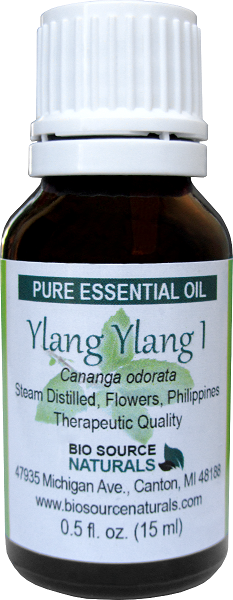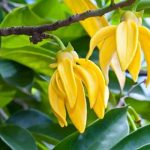
Ylang Ylang Essential Oil Properties (Cananga odorata)
Ylang Ylang essential oil seduces the senses and relaxes the mind with an intensely sweet spicy, floral scent.
- 100% Pure, Concentrated, Undiluted
- Grade I – Therapeutic Quality
- Steam Distilled from Flowers
- Country of Origin: Philippines
Ylang Ylang Essential Oil Packaged
Amber glass bottle with Euro plug. Tamper proof safety seal seal. Shrink wrapped.
Background Information on Ylang Ylang Essential Oil
The Ylang Ylang tree was first made known by explorer and botanist John Ray of England (1628 – 1705). It was first distilled by Albert Schwenger while in Manila in 1860. Later it was introduced to various other tropical countries by the French and planted in such places as Reunion and Madagascar. It had long been worn and hidden in the hair of the women of some of these cultures. The most traditional use known was for medicinal purposes, used in Java to fight malaria and fresh petals from the flowers were used to help with asthma.
Ylang Ylang (“flower of flowers”) is a type of tree, in which the flowers are collected for the essential oil. These evergreen trees can grow to be 80-100 feet tall, with glossy green leaves, and large powerfully scented yellow flowers. The flowers must be plucked from the trees at dawn; otherwise they will bruise and become discolored, making them useless. These trees are native to Indonesia, Philippines, and Comoro Islands.
Ylang Ylang Essential Oil Uses and Benefits
Ylang ylang pure essential oil aids issues of palpitations, anxiety, depression, and high blood pressure. It is also a proven sedative, and tonic. The Flower-of-Flowers tree is notorious for their relaxing properties, which promote a soothing sleep.* Ylang ylang has also been used as an aphrodisiac. This oil works hand in hand with our spirit to amplify the senses, and develop our internal femininity and creativity. The mind and this flower oil work as one to revitalize energy and feelings of joy. The body also collaborates with ylang ylang increasing liveliness, easing PMS, cleansing facial skin, and easing stress in regard to blood pressure.* Ylang ylang is also found in perfumery.
Ylang ylang is said to aid the cardiovascular, endocrine and hormonal systems. Additionally and more widely known are its benefits on the emotional and spiritual plane. Most commonly this oil is used as an aromatherapy for stress and anxiety, and is also reported to help balance mood swings. Promotion of healthy skin and hair as well as being used to fight against depression and lift one’s spirit are other positive qualities attributed to ylang ylang essential oil.*
Ylang ylang oil aids in the release of possessive emotional patterns, feeling drained, and fearing wisdom. This oil is known to have an intoxicating aroma, and this is its best known characteristic.
Ylang Ylang Essential Oil Uses and Benefits / Emotional Wellness Properties
Ylang ylang increases intuition, heart healing, joy and freedom. Helpful to those who are disconnected from inner child, sad, lost a loved one, overstressed or joyless.
If using Ylang ylang for emotional wellness, try using it with our free EFT Tapping scripts for Forgiveness and Open Heart which help release these emotional issues.
Ylang Ylang Essential Oil Uses and Benefits / Suggestions & Blends
- To be a touch more extroverted, take a bath with 2 drops ylang ylang and 4 drops of tangerine.
- To receive feelings of joy, mix ylang ylang, benzoin and tangerine, and apply it to tense areas.
- To increase liveliness, and soften PMS symptoms, bathe with 2 drops ylang ylang and 4 drops of coriander.
- To normalize skin, apply 2 drops of ylang ylang, 4 drops Australian sandalwood, and 4 drops grapefruit in 4 tsp skin mousse.
- To ease stress (related to high blood pressure), mix ylang ylang, lavender, and sweet orange, and apply it to areas where you store tension
- Use ylang ylang as a DIY facial cleanser, a floral perfume, try adding to coconut oil for a deep hair conditioner, as a massage oil, as sedative in the form of aromatherapy and even as an aphrodisiac!
- Some of the lesser known suggestions even encourage use as a source of healing from emotional trauma or to apply the oil over the area of the heart for promoting emotional balance.
- Use ylang ylang in a bath salt, by adding approximately ten drops of ylang ylang essential oil with 10 drops of geranium essential oil along with 15 drops of grapefruit essential oils combined with two cups of epsom salt, pouring under hot water and allowing to dissolve completely.
Ylang Ylang Essential Oil Safety Tips
- Ylang Ylang oil is non-toxic and safe for all skin types. Maximum skin use level is 0.8%. Avoid if you have hypersensitive, diseased or damaged skin, and on children under 2 years of age.
- ATTENTION TO THOSE PRONE TO HEADACHES: Ylang Ylang has a VERY strong aroma and could easily trigger painful headaches and migraines.
- For external use only. See our Safety Information page for further details when using essential oil.
Ylang Ylang Essential Oil Reviews
“Strong and pure scent! Great quality! Thank you!!” – DeepOceanBlue
“Ylang Ylang is a wonderful relaxing essential oil. Placing it in a carrier oil to use for massage is perfect. It leaves a light fragrance on the skin so the relaxation continues long past the massage.” – H. Stopp


